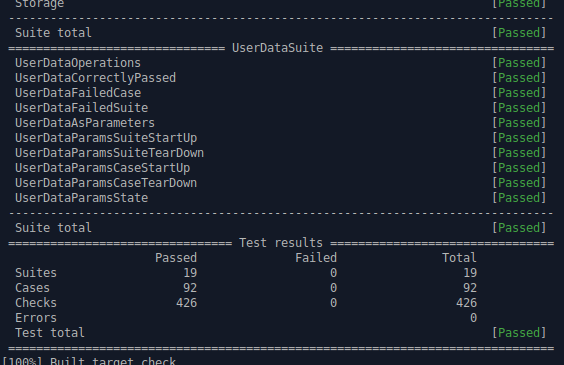About
OTest2 is a small C++ framework designated for writing of any kind of automated tests (unit tests, integration tests, etc.). Its design is derived from an older project of mine written while I was working for Aveco - that’s why there is number 2 in the name. As far as I know the original project is still in use.
Current release version is 1.3.0.
Features
- An xUnit kind framework.
- No need to write boiler plate code - it’s done by a generator.
- DSL is a valid C++ code which doesn’t break fancy IDE functions like code assistance.
- Very cautious usage of C macros.
- Test cases are grouped in suites.
- Tags can be assigned to both test suites and test cases. There is a tag glob language allowing filtering of teting objects from test execution.
- A rich set of assertion functions. Beside the generic assertion there are relational assertions, assertions comparing content of STL containers or text files. The framework allows implementation of custom assertion functions.
- Test fixtures are supported both in the suites or the test cases. The fixtures may be initialized and destroyed by their constructor and destructor methods (as it’s common in C++) or they can be initialized in special start-up and tear-down methods.
- Test sections allow to share the same initialization code with several testing sections.
- User can implement own fixture objects with hook methods invoked during start-up and tear-down phase of suite or test case where the object is used.
- Possible integration with custom main event loop. The framework doesn’t control run of the tests but it offers an API which can be invoked from the main loop. A default implementation of the loop is available too.
- User data may be passed from the main function into the testing functions. User can inject some context into tests.
- Regression test marks - a structured representation of complex data like logical state of an object or some complex output of something. The marks can be stored and then checked in following runs of the test.
- Exception handling. The framework offers special try/catch directive which allows to check whether an expected exception occurs. Unexpected exceptions unwound from testing objects are caught, reported and the test is failed.
- A custom exception catcher can be injected into the framework to handle your exception objects.
- One can implement a repeater object which controls repeated run of testing objects. The repeater is not just a list of values but a dynamic object with possible access to fixture objects.
- Optional report in the JUnit XML file format.
- Nice color console report:

Supported Platforms
The framework is developed and tested on Debian Stretch distribution. Generally, it should work on any UNIX-like system which the libclang is supported for. There is no current intention to support MS Windows.
Design Goals
No Boiler Plate Code
It’s sometimes unbelievable how much work must be done in some testing frameworks in order to write a two-lines test. The OTest2 framework allows you to focus just on coding what you need. All the annoying work is done by a pre-processor based on the libclang.
Libclang offers a full C++ parser opening door to a world of almost unlimited possibilities. Hence, the OTest2 DSL has been implemented as a valid C++ source marked by some clang annotations1. The pre-processor parses a source file and transforms it to another C++ source extended by all needed service code - filling source locations into test assertions, enveloping of testing code by classes, registration of factory functions of suites and cases or passing of fixture variables between testing objects.
Extensible for Different Environments2
The framework offers several interfaces which can be implemented by the user and injected into the framework. So it can be easily integrated with your custom main event loop or a custom collector of test results. The user is allowed to implement own test assertion, catcher of unhandled exceptions or his very own test reporter.
More about extending is in the section Extending the Framework.
Usability in IDEs
There are some testing frameworks defining their special DSL. This is a mighty approach allowing describing of everything needed. However, there is a dark side. The code is not valid C++ and all fancy features of IDEs like code highlighting or code assistance stop working until someone develops a plugin supporting the DSL.
OTest2 framework keeps that on its mind. The DSL is designed to be valid C++ code with cautious usage of macros3. Hence, the OTest2 file should be fully working in every sane IDE.
How to Explore
The best way to explore the framework is following the examples how to use and the examples how to extend the framework. Reference style documentation can be to in the reference documentation. A guide how to compile and install the framework in your environment can be found in the install guide.
-
The annotations are hidden in macros as their usage is not so easy as in other programming languages. ↩
-
The term environment doesn’t mean platform. It means different libraries and technologies, like custom main loop or some strange collector of test results. ↩
-
Some C++ testing frameworks wraps their functionality into really huge macros. Their definitions are so complex that the IDEs’ code assistance parsers fail to process them. ↩
